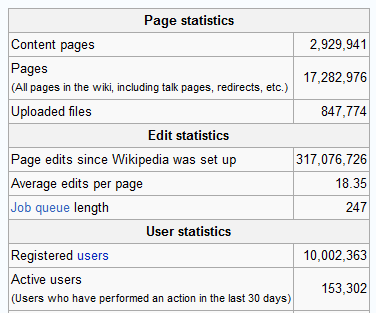 It’s pretty amazing the Wikipedia exists at all, let alone that it includes over 17.3 million articles in over two hundred languages. Millions of people around the world use the free web-based encyclopedia daily, be it bloggers researching on a particular software, students working on their projects, teachers using it as an educational tool and the list goes on. Gradually, the encyclopedia that anyone can edit has become a household name. It’s not just its size or popularity, but also the way Wikipedia has evolved that makes it simple. Thousands of Web users volunteer their time and knowledge to help fulfill the community’s goal of providing every person in the world with a high-quality encyclopedia in their native language.
It’s pretty amazing the Wikipedia exists at all, let alone that it includes over 17.3 million articles in over two hundred languages. Millions of people around the world use the free web-based encyclopedia daily, be it bloggers researching on a particular software, students working on their projects, teachers using it as an educational tool and the list goes on. Gradually, the encyclopedia that anyone can edit has become a household name. It’s not just its size or popularity, but also the way Wikipedia has evolved that makes it simple. Thousands of Web users volunteer their time and knowledge to help fulfill the community’s goal of providing every person in the world with a high-quality encyclopedia in their native language.
The non-commercial online encyclopedia which was launched on January 2001 by Jimmy Wales and Larry Sanger, has just surpassed the 10 million registered users mark, hitting a milestone. One of the world’s most visited sites on the Web, Wikipedia represents the future of publishing, and every company that produces information – from publishers to data providers – should be scared.

Surprisingly, only 1.53% or 153,000 registered users are actually active which means that they have performed only an action in the last 30 days. Despite the low rate, these volunteers who have spared some time from their busy schedule made an astounding 317 million page edits since it was set up. This is equivalent to 18.35 average edits per page. Currently, there are over a thousand adminstrators who have been entrusted with access to restricted technical features which help with maintenance. These adminstrators are able to protect, delete or even block other editors to prevent them from making inaccurate edits.
As a 15-year-old student, I visit Wikipedia on a frequent basis to read up more about certain Science subjects such as Physics and Chemistry. However, I find it tough to comprehend some of those complicated Scientific terms. Besides that, I could easily spot a few errors in every page. And this issue has also sparked some controversies by Internet users and bloggers, especially in comparison with Encyclopedia Britannica. Nature magazine’s comparative analysis of 42 science entries in both showed a surprisingly small difference: Wikipedia consisted 4 inaccuracies per entry to Britannica’s 3.

Britannica has disputed this finding, saying that the errors in Wikipedia were more serious than the Britannica errors, and that the source documents for the study included the junior version of the encyclopedia as well as the Britannica yearbooks. Unfortunately for Britannica, its complaints really miss the point – errors cited on Wikipedia have long been fixed, while the Britannica errors remain. In the same way that open source programmers swarm together to identify and fix bugs, Wikipedians can easily catch errors and set the record straight. According to an MIT study, an obscenity randomly inserted on Wikipedia is removed in an average of 1.7 minutes. Wikipedia will no doubt always have its critics. Robert McHenry, former editor-in-chief of Britannica, complains that despite the process of iterative edits, the quality of Wikipedia entries is still “what might be expected of a high school student.”
I’m sure most of you guys will agree with me that Wikipedia’s openness leaves it vulnerable to inaccuracies, edit wars, and vandalism. However, with the trust and abilities of ten of thousands of users who dedicate their precious time updating and removing errors in pages, Wikipedia will continue its amazing success on the long run.